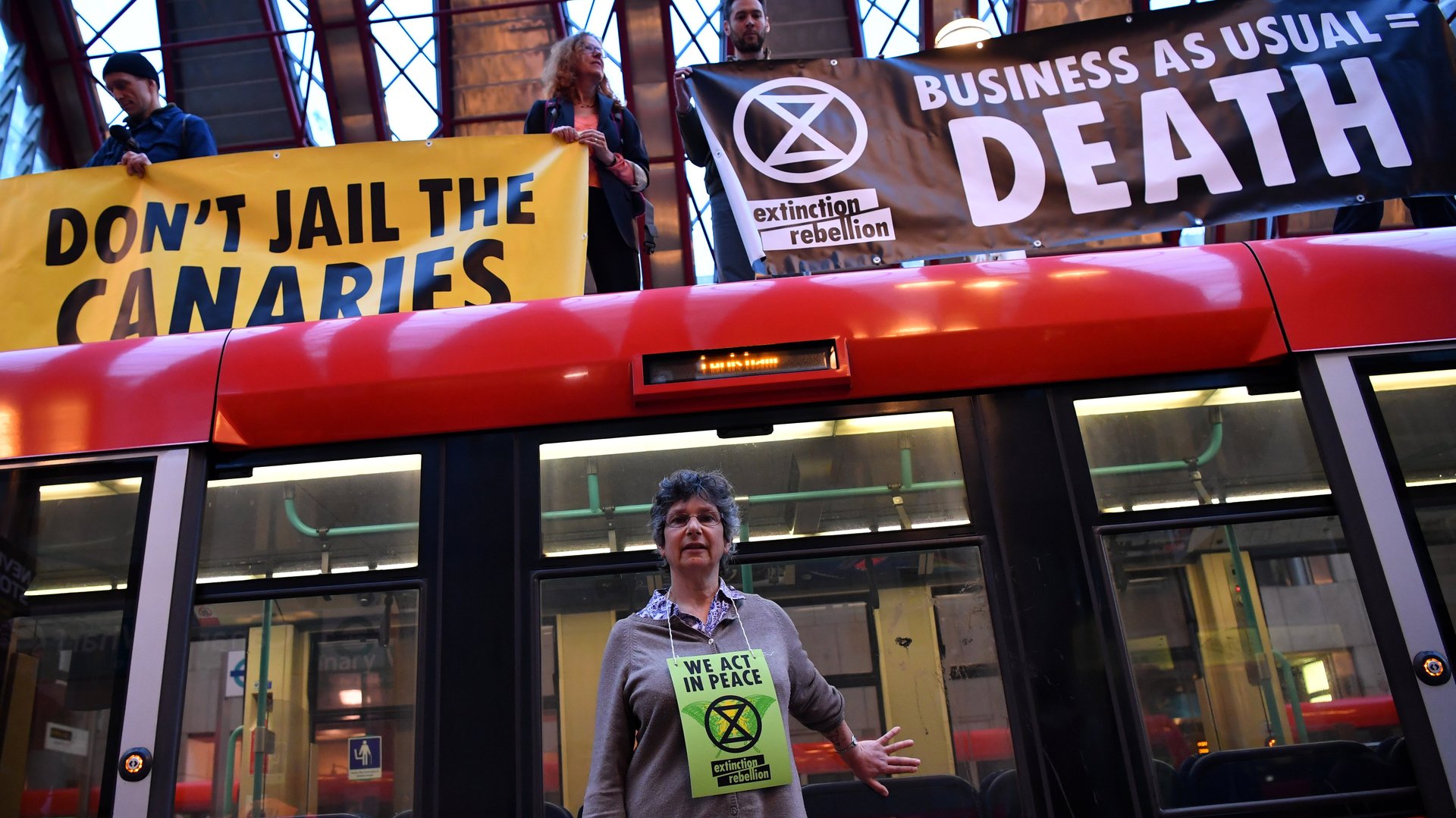The logic of disrupting public transport to protest climate change
Akshat Rathi, who covers climate change for Quartz, and Cassie Werber, who used to, found themselves discussing the environmental group Extinction Rebellion’s latest protest on the phone and over Slack, the instant messaging platform…


Akshat Rathi, who covers climate change for Quartz, and Cassie Werber, who used to, found themselves discussing the environmental group Extinction Rebellion’s latest protest on the phone and over Slack, the instant messaging platform…
Cassie: Wow, people are really angry about these Tube protests in London.
Akshat: Yeah, targeting public transportation has a multiplier effect. Stopping one train at one stop makes the entire network struggle. No wonder people are angry. Maybe this will turn Londoners against Extinction Rebellion?
C: For a popular movement that wants support from the maximum number of people possible, it seems like a really bad idea. Then again, without actually disrupting people’s lives, you can see how the issue might get sidelined.
A: I don’t think they want everyone to join the movement. They want to bring the climate crisis to people’s attention, but perhaps only convince a small number to become as active as they themselves are. A figure I’ve seen thrown around is that 3.5% of highly engaged citizens can bring about big changes.
C: I think it’s also because XR is decentralized. Some spokespeople have even said they think the Tube disruption wasn’t a good idea. There’s something intangible about popular movements: they seem to succeed or fail because of a whole mixture of things, and goodwill is one part of that.
A: Right, decentralization is a potential strength, but also a weakness. XR is growing very quickly. It’s spread to many cities in the UK and to many countries, too. It’s not possible to control every decision.
C: Other decentralized movements have had massive impact though. #MeToo is a decentralized movement, which didn’t have organizers as such, but which has brought about some really big societal and individual changes.
A: The anger and violence from the crowd at Canning Town was scary though. Somebody dragged a protestor down and it seems a group of people kicked him while he was on the platform.
C: Yes, it was scary. Once people aren’t bound by the “normal” social rules of behavior (for example, if they’re in a big crowd and can’t leave) things break down really quickly. But I do have a theory about why this particular scene unfolded the way it did—and why people get so angry about having their commutes disrupted. I think it comes down to our relationship with work, which is where most people are trying to get to during “rush hour.” If you have a supportive workplace and a secure job, disrupted travel is just annoying. But if your work is precarious, and you’re in fear of losing earnings or your job, that fear can quickly turn to fury. Canning Town is in Newham: one of the poorest boroughs in London.
A: That’s true. Mob mentality can take over really quickly. XR do deserve credit that, until now, things have been mostly peaceful. This is despite the London police banning protest as a breach of public order. The UN special rapporteur has said that ban was a “clear violation of human rights, including freedom of expression and freedom of association.”
C: Are XR’s tactics likely to be effective?
A: We know from past movements that it’s possible. XR likes to cite the suffragettes’ struggle to get women the right to vote in the UK, and Mahatma Gandhi’s peaceful protests to free India from British rule. But we should remember that those movements owe their success at least partially to external forces. India was granted independence in 1947 by a Britain left bankrupt after World War II.
C: And the suffragettes won at a time when Britain’s demography was changing and the country had been through World War I. So does that mean there’s not going to be any change without the external force of…a war?
A: I think the point might be that any societal change won’t happen without some sort of suffering. The impact of climate change is being felt, here and now. Just look at the news: the world is stricken with wildfires, hurricanes, floods, and droughts. They are only likely to get worse without drastic cuts in emissions. The difficulty is that, unlike in a war, the suffering is diffused—it’s across the entire planet and it’s set to continue over a long period of time. The point XR is making to commuters whose lives are temporarily disrupted is as follows: feel the suffering, experience it. Is that a bad thing?
C: So you mean that huge climate events—like hurricanes and typhoons—are the external force, alongside protest, that could push forward radical change. And you could also see low-carbon technology as another “external force.” Some technologies that can make a difference now have real momentum, like renewable energy and batteries. Have we answered the question about whether disrupting public transport—which is also part of the solution—is a good or a bad plan for climate “rebels”?
A: XR’s goal isn’t to bring everyone on board with their way of protest. Let’s face it, civil disobedience cannot be for everyone, especially those from less privileged backgrounds. Instead, the tactics are all about gaining attention… and the fact that we’re talking about it means it’s working, right?
C: Yes. Though they say it’s economic disruption they’re going for—not individual pain. They apologise in all their communications for causing people inconvenience. (Hey, I just got an email from XR responding to the Canning Town incident. It says: “In light of today’s events, Extinction Rebellion will be looking at ways to bring people together rather than create an unnecessary division.” You can read the full statement here.)
Btw, I’m working from home.
A: Me too. We’re some of the lucky ones.